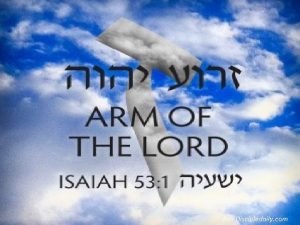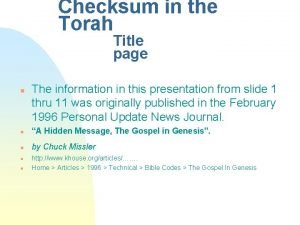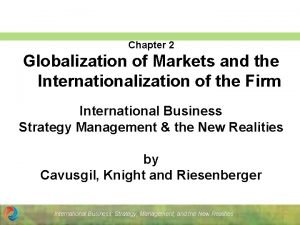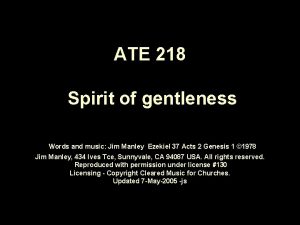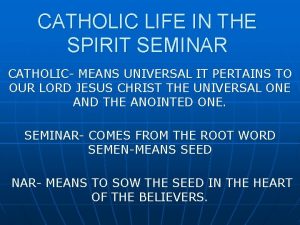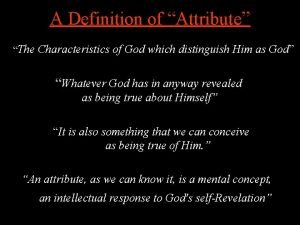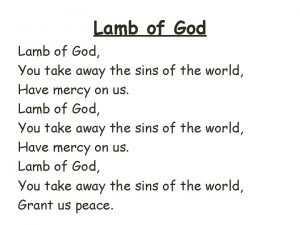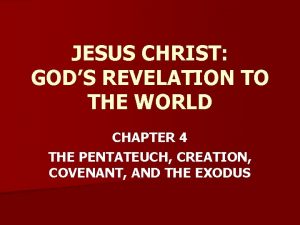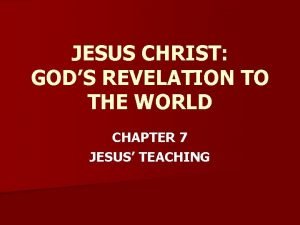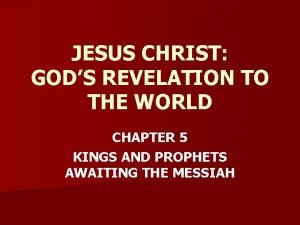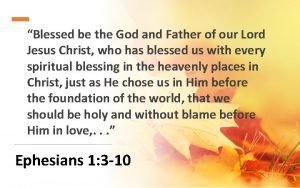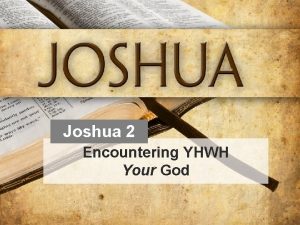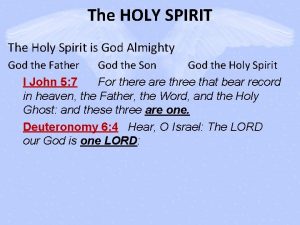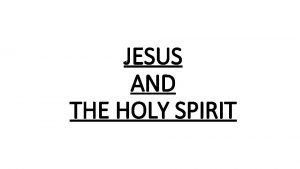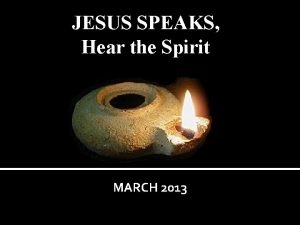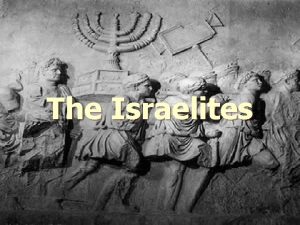GOD JESUS SPIRIT REAP 2015 GOD YHWH is
































- Slides: 32

GOD, JESUS, SPIRIT REAP 2015

GOD YHWH is the only proper name of God in the Tanakh in the sense of a personal name. Over time, it became forbidden to say the name and the actual pronunciation is lost. Words such as Elohim (god, or authority), El (mighty one), El Shaddai (almighty), Adonai (master), Elyon (most high), Avinu (our father), are not names but titles, highlighting different aspects of YHWH and the various roles of God.

SOME KEY NAMES/ROLES FOR GOD IN THE OLD TESTAMENT 1. Eloah: (singular, feminine, used in poetry & Job); Elaha- common name for God as at the Roman Occupation. 2. Elohim: all powerful one; God of Gods; common name for God. Gen 1: 1 3. El Shaddai: God Almighty 4. Ehyeh-Asher-Ehyeh: first of three responses given to Moses. “I will be who I will be” 5. YHWH: Tetragammaton. (Four letters- Yod Heh Wah Heh- “He is” ). Unspoken name of God after the second temple period. (Gen 2: 4) Appears 6828 times in OT. 6. Adonai: (plural) The Lord. Used for the name of God since the Hellenistic period. 7. YHWH Tzevaot: YHWH of hosts- earthly or heavenly 8. Avinu: Our Father 9. The Name

SPIRIT

THE SPIRIT The Spirit of God in the Old Testament The term “Holy Spirit” is a theological statement from the New Testament. However, the concept of the Spirit of God appears frequently in the Old Testament and in the light of the Christian belief in the Trinitarian nature of God, it is possible to explore references to the presence of the Spirit in Israel before Jesus. The concept of the Spirit of God developed over time in Israel, as did their understanding of God.

THE SPIRIT OF GOD: PRESENCE TO POWER TO BEING HTTP: //WWW. CHRISTUSREX. ORG/WWW 1/OFM/JUBPIZZ. HTML The Spirit of God came to be understood as a sort of “assistance of God” (God who assists his people in the desert, God who helps the Jews through specific duties), then as “the Presence of God” (the burning bush or the column of fire), or “the Power of God”, until it comes to be understood , as in the later books, somewhat (“quasi”) as a separate being of God. The texts of Wisdom 15: 11, Proverbs 8, Sirach 24, and Psalm 51 are some of the classic examples of this movement.

SYMBOLS OF THE SPIRIT IN THE OT: WATER It was and always is the symbol of God who purifies, who gives life, who gives birth and at times, also destroys the wicked. “I will pour out my spirit upon your offspring, and my blessing upon your descendants” (Isaiah 44: 3; see also Isaiah 44: 5 -6)

SYMBOLS OF THE SPIRIT IN THE OT: FIRE Fire was certainly a common symbol to indicate the presence and action of God/s in specific circumstances in all of the Ancient Near East. “As I looked, a stormwind came from the North, a huge cloud with flashing fire (enveloped in brightness), from the midst of which (the midst of the fire) something gleamed like electrum” (Ezekiel 1: 4) From the fire, there are seraphim that stand in the presence of God and shine as if on fire. (Seraphim is derived the Hebrew word “seraf” which means “to be on fire” or “to burn”. ) The fire that comes forth from the throne, or the column of fire and smoke are visible signs, almost like “intermediaries” of the presence and the action of God, whom no one can see, and with whom no one can speak directly.

SYMBOLS OF THE SPIRIT IN THE OT: WIND (RUAH) Wind is always connected in some way with the appearance or the action of God, but indicates, however, a reality that is always in motion. Whether it is a question of a gentle breeze (Job 4: 15; 1 Kings 19: 12)) or of a mighty wind (Job 8: 2), or even a violent storm (Psalm 55: 9), it is always God who is moving it. And it is always God who is the source of the action sustained by ruah. The powers present in the wind, and no one knows where it comes from, are elements which make it possible to see in them the mysterious presence of God.

THE SPIRIT OF THE LORD In ancient times, the action of the spirit was not a permanent gift, but always a dynamic and shattering force that took possession of a person for a short time and for a specific task, almost always for the purpose of guiding the people of Israel. According to Judaic interpretation, Moses was the exception, the one who saw the Lord face to face (Deuteronomy 34: 10), and who, for all his life, received a special power from God. In the book of the Judges, according to scholars, we have the very ancient declaration of the expression “spirit of the Lord” which is found no less than seven times in the book. The spirit “empowers” (Judges 6: 34), “penetrates” (Judges 14: 6, 19), “pushed, or stirred” (Judges 13: 25). In a word, God sends a power upon a specific person for the purpose of saving his people. In the book of Judges, the real protagonist is the “spirit of the Lord”, and through the spirit, poured forth on various persons, that God saves the people. It is the Holy Spirit, the ruah hakodesh, the Breath of Holiness- now more like a separate existence.

THE SPIRIT OF THE LORD AND THE MESSIAH • In Isaiah, the relation between the spirit and the Messiah is also very important. It is important to note that the idea of the spirit changes in radical ways with the monarchy, especially with the monarchy of David. If at first the spirit was a shattering and transitory power, with the coming of David to the throne, it slowly transforms itself into a stable force, into a continuous assistance for the house of David. If at first the ruah came as “special envoy”, now it “rests” on the elect of the Lord (2 Kings 2: 15). • For example, it is said of David that the Lord created him “a man after his own heart” (1 Samuel 13: 14). Therefore, the Messiah, his descendant, “shall judge the poor with justice, and decide aright for the land’s afflicted” (Isaiah 11: 4). “The spirit of the Lord shall rest upon him: a spirit of wisdom and of understanding, a spirit of knowledge and of fear of the Lord” (Isaiah 11: 2). “Here is my servant whom I uphold, my chosen one with whom I am pleased, upon whom I have put my spirit; he shall bring forth justice to the nations” (Isaiah 42: 1). “The spirit of the Lord God is upon me, because the Lord has anointed me; He has sent me to bring glad tidings to the lowly” (Isaiah 61: 1).

THE SPIRIT IN THE NEW TESTAMENT HTTP: //WWW. VATICAN. VA/JUBILEE_2000/MAGAZINE/DOCUMENTS/JU_MAG_01061998_P-08_EN. HTML The revelation of the Holy Spirit as a person distinct from the Father and the Son, foreshadowed in the Old Testament, becomes clear and explicit in the New. It is true that the New Testament writings do not offer us systematic teaching on the Holy Spirit. However, by gathering the many statements found in the writings of Luke, Paid and John, it is possible to perceive the convergence of these three great currents of New Testament revelation concerning the Holy Spirit.

JESUS AND THE SPIRIT Before being baptized with the Holy Spirit and with fire, Jesus was baptized in the Jordan and "the Holy Spirit descended upon him in bodily form, as a dove" (Lk 3: 22). Luke stresses that Jesus not only goes into the wilderness "led by the Spirit", but that he goes there "full of the Holy Spirit" (Lk 4: 1) and is victorious there over the tempter. He undertakes his mission "in the power of the Spirit" (Lk 4: 14). In the synagogue at Nazareth, when he officially begins his mission, Jesus applies to himself the prophecy of the book of Isaiah (cf. 61: 12): "The Spirit of the Lord is upon me, because he has anointed me to preach good news to the poor" (Lk 4: 18). All of Jesus’ evangelizing activity is thus guided by the Spirit.

THE EARLY JESUS MOVEMENT AND THE SPIRIT This same Spirit will sustain the Church’s evangelizing mission, as the Risen One had promised his disciples: "Behold, I send the promise of my Father upon you; but stay in the city, until you are clothed with power from on high" (Lk 24: 49). According to the book of Acts, the promise is fulfilled on the day of Pentecost: "And they were all filled with the Holy Spirit and began to speak in other tongues, as the Spirit gave them utterance" (Acts 2: 4). Joel’s prophecy is thus realized: "In the last days it shall be, God declares, that I will pour out my Spirit upon all flesh, and your sons and your daughters shall prophesy" (Acts 2: 17). Luke sees the Apostles as representing the People of God of the last days and rightly emphasizes that this Spirit of prophecy involves the whole People of God.

THE PAULINE CORPUS AND THE SPIRIT For Paul, the Spirit is seen as the source of the new and eternal life that Jesus communicates to his Church. Believers no longer five as slaves under the law, but as sons, because in their hearts they have received the Spirit of the Son and can cry out: "Abba, Father!" (cf. Gal 4: 5 -7; Rom 8: 14 -16). It is a life "in Christ", that is, a life of belonging exclusively to him and of incorporation into the Church: "For by one Spirit we were all baptized into one body" (cf. 1 Cor 12: 13). The Holy Spirit gives rise to faith (1 Cor 12: 3), pours love into our hearts (cf. Rom 5: 5) and guides the prayer of Christians (cf. Rom 8: 26). By opening themselves to the Holy Spirit, Christians can taste the fruits of the Spirit: love, joy, peace, patience, kindness, goodness, faithfulness, etc. (cf. Gal 5: 16 -24).

THE JOHANNINE COMMUNITY AND THE HOLY SPIRIT • In the Johannine perspective, the Holy Spirit is above all the Spirit of truth, the Paraclete. • In John, Jesus announces the gift of the Spirit as he completes his earthly work: ‘When the Paraclete comes, the Spirit of truth who comes from the Father – and whom I myself will send from the Father – he will bear witness on my behalf. You must bear witness as well, for you have been with me from the beginning" (Jn 15: 26 ff. ). • In further explaining the Spirit’s role, John’s Jesus adds: "He will guide you into all the truth; for he will not speak on his own authority, but whatever he hears he will speak, and he will declare to you the things that are to come. He will glorify me, for he will take what is mine and declare it to you" (Jn 16: 13 -14). • Thus, the Spirit will not bring a new revelation, but will guide the faithful to an interiorization and deeper penetration of the truth revealed by Jesus.

JESUS Yeshua/Yeshu (God Saves) is the only proper name for the historical Jesus in the New Testament. All other titles either given to him by others or which the gospel writers have him attribute to himself, are roles or theological understandings.

TITLES/ROLES FOR JESUS Scripture Titles Son of God King of the Jews Son of Man Church Titles Word of God Prophet Second person of the Trinity Messiah (Christ) Saviour Jesus Christ Sacred Heart Lamb of God Suffering Servant Pantocrator Father of the Poor Master/Teacher Emmanuel King of Kings Eternal Wisdom Rabbi/Rabbouni/ Logos Lord of Lords The Homeless Jesus Lord Great High Priest God the Son Tortured Christ Holy One of God Alpha & Omega Prince of Peace I Am (54 times) Advocate Christ the King Son of Mary Shepherd God Incarnate Son of David Others God from God Light from Light

JESUS IN THE GOSPELS

The Historicity of the Record The Jesus tradition of scriptures therefore, contains three major layers: One of retention, recording at least the essential core of words and deeds, events and happenings, but little or no personal details; One of development, applying such data to new situations, novel problems and unforeseen circumstances One of creation, not only composing new sayings and stories, but above all creating larger complexes that changed their contents. (i. e. many gospels) • • • Jesus left behind him thinkers not memorisers, disciples, not reciters, people, not parrots. (Crossan)

ARE WE PRESENTED WITH A SINGLE PORTRAIT OF JESUS, CHRIST IN THE GOSPELS?

TWO GOSPEL (THEOLOGICAL)PORTRAITS • The Synoptic Gospels • Begin with John the Baptist or birth and childhood stories • Jesus is baptised by John • Jesus speaks in parables and aphorisms • Jesus is a sage • Jesus is an exorcist • God's imperial rule is theme of Jesus' teaching • Jesus has little to say about himself • Jesus espouses the causes of the poor and oppressed • The public ministry lasts one year • The temple incident is late • Jesus eats last supper with his disciples • The Gospel of John • Begins with creation; no birth or childhood stories • Baptism of Jesus presupposed but not mentioned • Jesus speaks in long, involved discourses • Jesus is a philosopher and mystic • Jesus performs no exorcisms • Jesus himself is theme of his own teaching • Jesus reflects extensively on his own mission and person • Jesus has little or nothing to say about the poor and oppressed • The public ministry lasts three years • The temple incident is early • Foot washing replaces last supper

WHAT DO WE KNOW ABOUT THE JESUS OF HISTORY ?

THE PRE- AND POST-EASTER JESUS Pre-Easter Jesus: (4 BCE- 30 CE) • Corporeal human being • Finite and Mortal • Human • A pan-Mediterranean Jewish peasant • Figure of past • Monotheistic Jew • Galilean Jew of the First Century Post-Easter Jesus/Christ: (30 CE-Present) • • Spiritual, non-material reality Infinite, eternal Divine King of Kings and Lord of Lords Figure of the present Jesus Christ Second person of the Trinity The human face of God

JESUS: A (JEWISH) MAN OF HISTORY

OUT OF A CONTEXT • • • Literary and historical studies Social history Anthropology Study of political systems History of religions Studies of honour and shame in societies Studies of peasant societies Studies of economic systems Medical anthropology Psychology

WHAT DO WE KNOW OF THE HISTORICAL JESUS? • From attestations given in the gospels and other records, it is now believed he was born around 4 -6 BCE: that is, when Herod was Governor of Judea. • He was born either in Bethlehem in Judea, or Bethlehem in Galilee; Nazareth in Galilee, or Qumran; or we don’t know. • His parents were Miriam (Maryam)and Yosef – an artisan from Nazareth • He appeared to have four brothers and two sisters, as recorded in NT documents. • Those brothers are called James, Joses, Simeon/Simon and Jude/Judas in New Testament texts. His sisters are possibly Miriam and Salome.

WHAT DO WE KNOW OF THE HISTORICAL JESUS? • He was a wandering preacher and healer in Judea and Galilee for between one and three years when he was about 30. • He was involved with John the Baptist’s movement and practised John’s baptism of repentance. • He was crucified during the governorship of Pontius Pilate between 26 -36 (33) CE. • A movement grew up around him during and after his death. • This new movement, a part of Judaism, claimed he had risen from the dead.

WHAT CAN WE TEACH ABOUT JESUS?

SOME “REAL” RECONSTRUCTION WE CAN TEACH Jesus was a: • Jewish Mystic / Spirit Person - One of those figures in human history who had frequent and vivid experiences of the sacred. He heard God calling him in the words of the prophets. He prayed, meditated and knew the Scriptures • Jewish Healer - The historical evidence that Jesus performed paranormal healings is very strong; he must have been a remarkable healer- physical and mental; psychological and spiritual • Jewish Wisdom Teacher - He taught a subversive and alternative wisdom. He was a storyteller and used images and metaphors that people knew and understood and “got”. • Jewish Social Prophet - Jesus stands in the tradition of the great social prophets of ancient Israel who challenged social systems. Himself a social outcast, at the bottom of the social ladder, shared God’s preference for the anawim. • Jewish Movement Founder / Initiator - A movement came into existence around him which embodied his alternative wisdom.

WHERE TO? …. there is very little history in our sense and no biology in the four canonical gospels. Any search for an Historical Jesus based on the gospels I consider misplaced (although there would be an army of biblical writers opposed to me). The Christian religious discourse is a statement of faith making use of mythic (used in the anthropological sense) elements to portray a founding teaching. Robert Crotty Emeritus Professor of Religion and Education, at the University of South Australia.

BIBLIOGRAPHY Names of God: https: //astudyoftheoldtestament. wordpress. com/course/section-13/names-of-god-in-judaism/ Accessed 28/05/2015 Spirit in the OT: http: //www. christusrex. org/www 1/ofm/jub/JUBpizz. html Accessed 28/05/2015 Spirit in the New Testament http: //www. vatican. va/jubilee_2000/magazine/documents/ju_mag_01061998_p-08_en. html Accessed 01/06/2015
 Steve merkel
Steve merkel Yhwh
Yhwh Torh torh yhwh hrot hrot
Torh torh yhwh hrot hrot R15 reap
R15 reap Don't judge each day by the harvest you reap
Don't judge each day by the harvest you reap Whoever sows sparingly will also reap sparingly
Whoever sows sparingly will also reap sparingly For internationalizing firms the consequences
For internationalizing firms the consequences You reap what you harvest
You reap what you harvest Jesus jesus jesus sweetest name i know
Jesus jesus jesus sweetest name i know Jesus jesus jesus in the morning
Jesus jesus jesus in the morning Come holy spirit dove divine
Come holy spirit dove divine Spirit spirit of gentleness
Spirit spirit of gentleness Receiving god's gifts life in the spirit seminar
Receiving god's gifts life in the spirit seminar God is a spirit those who worship him
God is a spirit those who worship him Refresh and gladden my spirit
Refresh and gladden my spirit The attribute incorporeal means god is a spirit
The attribute incorporeal means god is a spirit Jesus you are my lord
Jesus you are my lord Hino 302
Hino 302 Jesus jesus how i trust him
Jesus jesus how i trust him Kerygmatischer christus
Kerygmatischer christus Lamb of god you take away the sins
Lamb of god you take away the sins Love love jesus is love god greatest gift lyrics
Love love jesus is love god greatest gift lyrics Poem about god's revelation
Poem about god's revelation Jesus christ god's revelation to the world
Jesus christ god's revelation to the world Jesus christ in very nature god
Jesus christ in very nature god Jesus christ god's revelation to the world
Jesus christ god's revelation to the world Jesus christ god's revelation to the world chapter 5
Jesus christ god's revelation to the world chapter 5 God sent his son they called him jesus
God sent his son they called him jesus Blessed be the god and father of our lord jesus christ
Blessed be the god and father of our lord jesus christ Jesus christ: god's revelation to the world
Jesus christ: god's revelation to the world How jesus became god summary
How jesus became god summary Jesus lamb of god worthy is your name
Jesus lamb of god worthy is your name There's only one god
There's only one god

